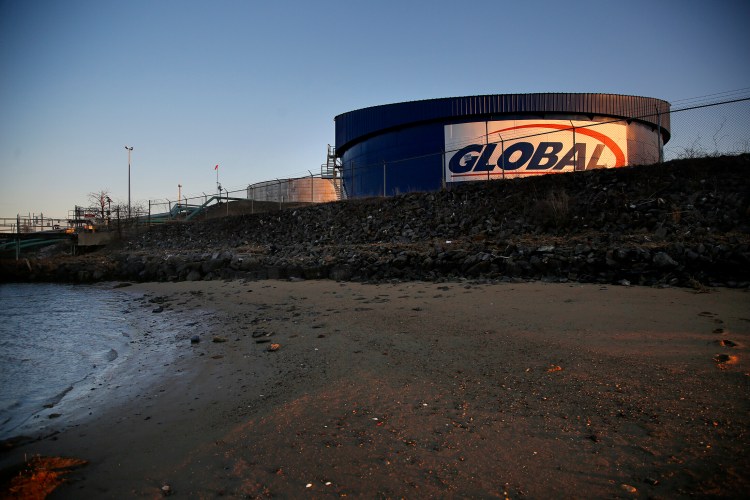AUGUSTA — Lawmakers from South Portland want to strengthen the state’s notification and air quality testing requirements in response to concerns that regulators failed to inform city officials about long-standing emissions violations from a petroleum tank farm.
Members of a legislative committee heard testimony Wednesday on two bills inspired by a controversy that began in March after a petroleum storage company agreed to a settlement over federal Clean Act violations. The U.S. Environmental Protection Agency knew since 2014 that Global Partners LP had been exceeding its emissions limits for years, but South Portland officials were surprised to learn about the violations in March.
One bill debated Wednesday would require the Maine Department of Environmental Protection to notify an affected municipality when the department issues a “notice of violation” or takes enforcement action for an air quality violation.
Sen. Rebecca Millett, a Democrat who joined other members of South Portland’s delegation in sponsoring the bill, acknowledged that her bill, L.D. 1706, would not address the Global Partners situation because the state cannot require a federal agency to notify municipalities.
But DEP officials were aware of the federal investigation and findings. And bill backers say the state should notify affected municipalities when they have issued a notice of violation or learn of a similar action by the EPA.
“This bill is before you to make sure that when there are air quality violations, the impacted community is notified,” Millett said. “It’s a matter of transparency and public health. Maine families have a right to know what they’re breathing in.”
A second measure, L.D. 1707 also sponsored by Millett and other South Portland representatives, would require that an independent, third party perform testing to ensure license holders are complying with their air quality emissions limits.
DEP officials testified in favor of the notification requirements, but opposed the third-party testing proposal, calling the bill “unnecessary and an oversimplification” of the department’s regulatory activities.
“We agree that it is important to have accurate information to assess compliance with regulatory and license requirements to ensure that licensed activities do not harm human health and the environment,” Deputy DEP Commissioner Melanie Loyzim said. “We believe we do have authority already …. to include requirements necessary in a license to ensure compliance, including the use of third-party inspectors or auditors, where necessary.”
The South Portland incident has brought to the forefront the long-standing concerns over community health, odor, noise, traffic and other concerns about the massive petroleum storage tanks along the city’s waterfront. It has also revealed a rift between the Maine DEP and its federal counterpart.
In a lawsuit and consent agreement filed in federal court, the EPA contends that for years Global Partners emitted more than double the 21.9 tons of volatile organic compounds, or VOCs, allowed under their license. But the Maine DEP disagreed with that conclusion, which was apparently based on a different testing methodology than typically used.
Asked if the two regulatory agencies work together on monitoring air pollution, Eric Kennedy with the DEP Bureau of Air Quality’s licensing and compliance division: “We do as much as we can. But we are not working together in this case.”
Both Kennedy and Loyzim said the municipal notifications could likely be carried out without creating a significant additional workload.
In submitted testimony, Portland sustainability coordinator Troy Moon urged lawmakers to include abutting municipalities in any notification requirement.
“For example, some homes in Portland are as close to the Global Partners storage facility as homes in South Portland,” Moon wrote to the committee. “It makes sense, therefore, that officials in both cities receive notification of any violations.”
The proposal to require independent, third-party testing generated more discussion and opposition on Wednesday, in part because confusion about the simplistic language.
Representatives from the Woodland Pulp LLC paper mill in Baileyville, as well as the union whose members conduct emissions testing and monitoring, took offense at what they viewed as insulting insinuations.
Scott Beal, environmental and security manager at Woodland Pulp, read the bill to suggest that only accurate and reliable data can come from independent testing. Beal said emissions monitoring equipment is calibrated daily, must meet strict accuracy standards and is audited annually.
“On behalf of the people that have dedicated their lives and their careers to environmental compliance, reading something like this, this bill really stings on a professional and a personal level,” Beal said. “This one suggests that we’re not to be trusted. I think that’s regrettable and I think it’s unfortunate.”
Shawn Howland, president of the Local 27 United Steelworkers Union that has 130 members at the Washington County mill, read the bill in a similar way. Howland said all employees take ethics training annually, have annual refresher training. But Howland said that, under his reading of the bill, between eight and 10 people could lose jobs if outside testers would be brought in to do the work.
“These high-paying jobs – with benefits and retirement – are extremely rare in our area,” Howland said. “These unemployed would find it very unlikely to find work anywhere near this benefit level.”
Ken Gallant, environmental manager at Verso Paper in Jay, said the committee should “rest assured” that there is a heavy focus on quality control and quality assurance.
“Personally, I don’t think we need yet more regulation or legislation to address what is probably a one-off problem (in South Portland) that can be handled in some other fashion,” Gallant said.
But committee chairman Sen. Brownie Carson, D-Harpswell, said he interpreted intent of the third-party testers to help verify compliance with emissions standards – not to replace existing monitoring by the companies – following the startling situation in South Portland.
“For the Legislature, I want you to know that this was not a statement of distrust of you or your employees, of any kind,” Carson said.
Send questions/comments to the editors.




Comments are no longer available on this story